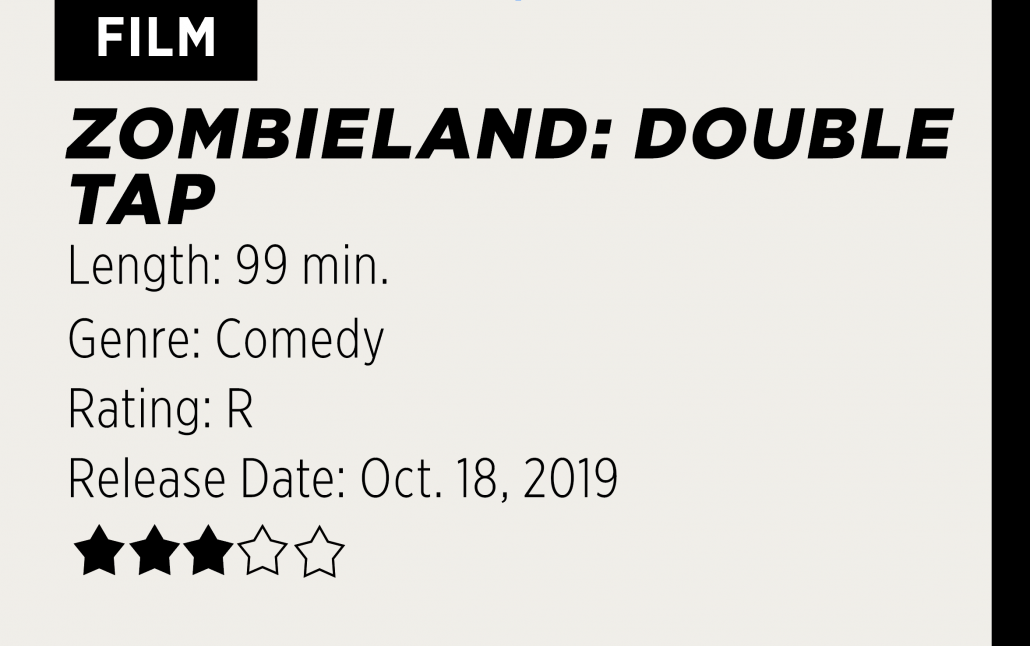REVIEW: ‘Zombieland’ sequel brings back beloved characters for an underwhelming plot

When “Zombieland” premiered in 2009, public fascination surrounding deteriorated, living carcasses was in its prime. The “28 Weeks” films and “Shaun of the Dead” all gained a cult following. “The Walking Dead” was about to become one of the most popular shows of the decade. In fact, it was so popular that the show inspired a spin-off series, “Fear the Walking Dead.” Even Brad Pitt got in on the craze with his performance in “World War Z.”
But with “Zombieland,” viewers see a divergence from the gritty, post-apocalyptic wastelands of these films with metacommentary on just how fun going on a zombie-killing spree can be.
The original, star-studded cast is back in “Zombieland 2: Double Tap,” but Woody Harrelson, Emma Stone, Jesse Eisenberg and Abigail Breslin look much different today than they did a decade ago. Stone is now one of the top actresses in the world. Eisenberg was able to break away from being a Michael Cera look-alike. Harrelson continues to be one of the most underappreciated actors and Breslin is no longer that child actor from “Little Miss Sunshine.”
Even the production team has matured. Writers Rhett Rhesse and Paul Wernick penned the fan-favorite “Deadpool,” signaling evolution in their metacommentary style. Even director Ruben Fleischer is now recognized as a bankable director after his commercial hit last year with “Venom.”
With a cast and crew that garners more prominence today, a sequel to a cult-favorite zombie film from a decade ago doesn’t seem to be the best use of their talent. However, rather than falling victim to sequel-itis, “Zombieland: Double Tap” embraces its zany premise for a film that shows audiences a good time.
Ten years later, Tallahassee (Harrelson), Wichita (Stone), Columbus (Eisenberg) and Little Rock (Breslin) are no longer driven to receive “Zombie Kill of the Week” or “Zombie Kill of the Year” awards now that everyone seems to be stepping up their game. Now, they long for domesticity, and what better place to settle down in than at the White House?
The place where executive orders are signed off becomes home to Christmas gifts wrapped in presidential portraits. Yet, domestic bliss only lasts so long for Little Rock, who feels trapped living in the White House; she wants to explore the world with people her age. In the case of Wichita, thoughts of marriage and settling down terrify her. Abruptly, both Little Rock and Wichita leave Columbus and Tallahassee all alone — that is, until Little Rock also leaves Wichita by herself. Now, the group must hit the road to find her. Kills will now be harder to come by, as a new form of zombie — the “T-800” — has become more elusive to kill.
“Double Tap” successfully embraces the dynamic chemistry between the four protagonists. They are emblematic of a dysfunctional family, as most of the laughs come from their ridiculous arguments about Elvis Presley or from heartbreak. Harrelson stands out among the four simply for being the most over-the-top character. This is a man who doesn’t care about political correctness while also being a caring father to Little Rock. He seems to be having the most fun reveling in the ridiculousness of his character, kicking and screaming like a child in one scene and being a badass zombie killer in the next.
Harrelson would’ve been the standout of the film if it weren’t for Zoey Deutch, who plays Madison, a character that Columubs and Tallahassee meet along the way. As Tallahassee notes, zombies will not kill her since she doesn’t have any brains. The “dumb blonde” stereotype is one that has been portayed countless times in films. It’s a trope that can, and does, grow tiring. Here, Deutch adds so much charisma to an otherwise throwaway character. As much as she will make viewers cringe from her “valley girl” persona, she willalso make them die of laughter from her seemingly meaningless remarks.
Unfortunately, Little Rock is the most insignificant character of the film. Her performance is fine, but the writers fail to give her much to work with throughout the film. She is simply used to advance the plot. As a result, she spends the majority of the film away from the main crew, depriving her of the hilarious back-and-forth banter that make this series worth watching. Her departure is what initiates the rest of the protagonists to go on their adventure. She adds next to nothing interesting to the film. A prolonged subplot between her and a stoner is the least interesting part of the film, making you wish that the film would cut back to Wichita’s snarky comments or the 70th rule that Columbus lives his life by.
Watching Columbus, Wichita and Tallahassee on the road to find Little Rock is the most entertaining part of the film, as this is where the in-your-face violence and character banter hit a consistent pace. Luke Wilson and Thomas Middileditch’s introduction as identicals to Tallahassee and Columbus slows down the pace. The jokes don’t go any further than, “Wow, isn’t it hilarious that Middleditch and Eisenberg are both scrawny nerds who follow too many rules?” It’s another case of a well-thought out idea that quickly burns out and how a film loses interest when it strays away from its protagonists.
“Zombieland: Double Tap” is not the sequel that audiences were clamoring for but the end result is a film that knows what it is: A fun action-comedy with characters we enjoy being with. This is not an allegorical tale about how society treats groups of people. This is not a film that demands to be seen as soon as possible, but if you do end up watching “Double Tap,” you’ll be genuinely delighted.


